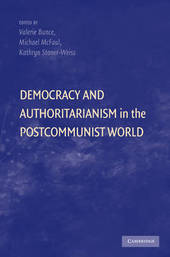
|
Democracy and Authoritarianism in the Postcommunist World
Paperback / softback
Main Details
| Title |
Democracy and Authoritarianism in the Postcommunist World
|
| Authors and Contributors |
Edited by Valerie Bunce
|
|
Edited by Michael McFaul
|
|
Edited by Kathryn Stoner-Weiss
|
| Physical Properties |
| Format:Paperback / softback | | Pages:360 | | Dimensions(mm): Height 235,Width 155 |
|
| ISBN/Barcode |
9780521133081
|
| Classifications | Dewey:320.91717 321.8 |
|---|
| Audience | | Tertiary Education (US: College) | | Professional & Vocational | |
|---|
| Illustrations |
8 Tables, unspecified; 3 Line drawings, unspecified
|
|
Publishing Details |
| Publisher |
Cambridge University Press
|
| Imprint |
Cambridge University Press
|
| Publication Date |
30 November 2009 |
| Publication Country |
United Kingdom
|
Description
Democracy and Authoritarianism in the Postcommunist World examines three waves of democratic change that took place in eleven different former Communist nations. It draws important conclusions about the rise, development, and breakdown of both democracy and dictatorship in each country, providing a comparative perspective on the post-Communist world. The first democratic wave to sweep this region encompasses the rapid rise of democratic regimes from 1989 to 1992 from the ashes of Communism and Communist states. The second wave arose with accession to the European Union (from 2004 to 2007) and the third, with the electoral defeat of dictators (1996 to 2005) in Croatia, Serbia, Georgia, and Ukraine. The authors of each chapter in this volume examine both internal and external dimensions of both democratic success and failure.
Author Biography
Valerie Bunce is the Aaron Binenkorb Professor of International Studies and Professor of Government at Cornell University. Bunce is the author, most recently, of Subversive Institutions: The Design and the Collapse of Socialism and the State (Cambridge, 1999), and her articles have appeared in the American Political Science Review, Comparative Politics, Comparative Political Studies, Politics and Society, and International Organization, together with a variety of area-based journals and edited volumes. Michael A. McFaul is the Peter and Helen Bing Senior Fellow at the Hoover Institution and Professor of Political Science at Stanford University. He is also a non-resident Senior Associate at the Carnegie Endowment for International Peace. He is the author and editor of several monographs, most recently Revolution in Orange: The Origins of Ukraine's Democratic Breakthrough (with Anders Aslund, 2006), Between Dictatorship and Democracy: Russian Postcommunist Political Reform (with Nikolai Petrov and Andrei Ryabov, 2004), and After the Collapse of Communism: Comparative Lessons of Transitions (with Kathryn Stoner-Weiss, 2004). Kathryn Stoner-Weiss is Associate Director for Research and Senior Research Scholar at CDDRL, Stanford University. She is the author of Resisting the State: Reform and Retrenchment in Post-Soviet Russia (2006) and Local Heroes: The Political Economy of Russian Regional Governance (1997). She is also co-editor of After the Collapse of Communism: Comparative Lessons of Transitions (with Michael McFaul, 2004).
Reviews'Democracy and Authoritarianism in the Postcommunist World surveys the waves of democratizing movements across the postcommunist region subsequent to the 1989-92 period to raise critical questions about the sources of regime change, among them popular protest and mobilization, opposition cohesiveness, the diffusion of organizational tactics, and the influence of external actors. The book considers both blocked and successful democratization movements. Several of the chapters are likely to stand as authoritative analyses of the outcomes of the electoral revolutions in particular countries. This is a significant volume of broad ambition.' Thomas F. Remington, Goodrich C. White Professor of Political Science, Emory University 'Necessary reading for all who seek to understand what has happened to democracy in the 29 postcommunist states, these exceptional essays by leading experts balance nuanced interpretations of the particularities of individual regimes with comparative insights that speak to all students of regime dynamics - particularly on the complexity, diversity, and instability of mixed or hybrid regimes and the decisive role that local democrats or authoritarians can play when they can draw on the resources offered by regional and global allies.' Philip G. Roeder, University of California, San Diego '... includes a number of excellent contributions by authors with roots in Eastern Europe and the former Soviet Union who are now based at leading US and European universities.' Oksana Antonenko, Survival: Global Politics and Strategy
|